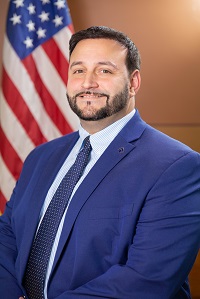TEMPORARY CAREGVER INSURANCE

Representative Giraldo
Too many workers aren’t currently covered by TCI because the definition of a family member is overly restrictive,” said Representative Giraldo. “This bill will ensure that workers who need to care for their siblings, grandchildren and dependents won’t need to worry about falling through the cracksToo many workers aren’t currently covered by TCI because the definition of a family member is overly restrictive,” said Representative Giraldo. “This bill will ensure that workers who need to care for their siblings, grandchildren and dependents won’t need to worry about falling through the cracks.

Senate Majority Whip Valarie Lawson and Rep. Joshua J. Giraldo are sponsoring legislation to expand Rhode Island’s Temporary Caregiver Insurance (TCI) program from six weeks to 12. That would bring Rhode Island into line with other states and allow new parents more time for parental leave and caregivers more time to care for a critically ill family member.
This legislation provides the invaluable resource of time at pivotal points in the lives of Rhode Islanders,” said Senator Lawson (D-Dist. 14, East Providence). “All should have the opportunity to care for a loved one.

Senator Lawson
Senator Lawson’s legislation (2024-S 2121) would also expand the definition of critically ill family to include grandchildren, siblings and “care recipients,” meaning individuals for whom the worker is a primary caretaker. Representative Giraldo (D-Dist. 56, Central Falls) has introduced the same legislation in the House (2024-H 7171.
Too many workers aren’t currently covered by TCI because the definition of a family member is overly restrictive,” said Representative Giraldo. “This bill will ensure that workers who need to care for their siblings, grandchildren and dependents won’t need to worry about falling through the cracks
The United States is one of only six countries in the world, and the only wealthy country, without guaranteed paid parental leave, according to the Bipartisan Policy Center. In recent years, some states have stepped up to offer their own Rhode Island became the third state in the nation to offer paid parental leave in 2013 when legislators created the TCI program. TCI, which is paid for through payroll deductions, allows new parents to take six weeks of paid leave to bond with and care for their child. It also allows individuals to take this time to care for a seriously family member. That can prove vital for a working adult who needs to care for their spouse after a surgery or a terminally ill parent.
Since 2013, however, many other states have surpassed Rhode Island’s leave offerings. Currently, 11 states and the District of Columbia offer paid parental leave, with two additional states set to offer it beginning in 2026. Most offer 12 weeks, while Rhode Island offers the least amount of time at just six weeks.Individuals on TCI in Rhode Island receive 60% of their normal salary. Of the ten states that offer similar programs, most workers receive at least 80%. In Massachusetts, workers receive 80% of their salary for 12 weeks. Workers in nearby Connecticut receive 95% of their salary for 12 weeks.
Paid family leave is a critical resource for families to be able to properly welcome new children to the world and care for aging or sick loved ones,” said Divya Nair, policy analyst with the Economic Progress Institute. “Rhode Island was a national leader when paid family leave was first passed in 2013 but we have since fallen behind other states with similar programs. Rhode Islanders deserve expanded paid family leave to properly care for loved ones.
In addition to the benefits for individuals, Senator Lawson and Representative Giraldo say, expanded parental leave has profound benefits for children and our wider society. Parental leave is associated with more relationship satisfaction and lower divorce rates for couples. Studies have found access to paid leave reduces infant mortality, hospital visits and childhood obesity while improving vaccination rates, educational outcomes and long-term parental engagement.
All of these factors have an economic impact as sicker children require more resources and healthier, better educated children have higher lifetime earnings.
This bill is an investment in our workforce and in our children, one that will pay off for generations,” said Senator Lawson. “A society where people have the time to bond their babies is a healthier society, in every sense of the word.
